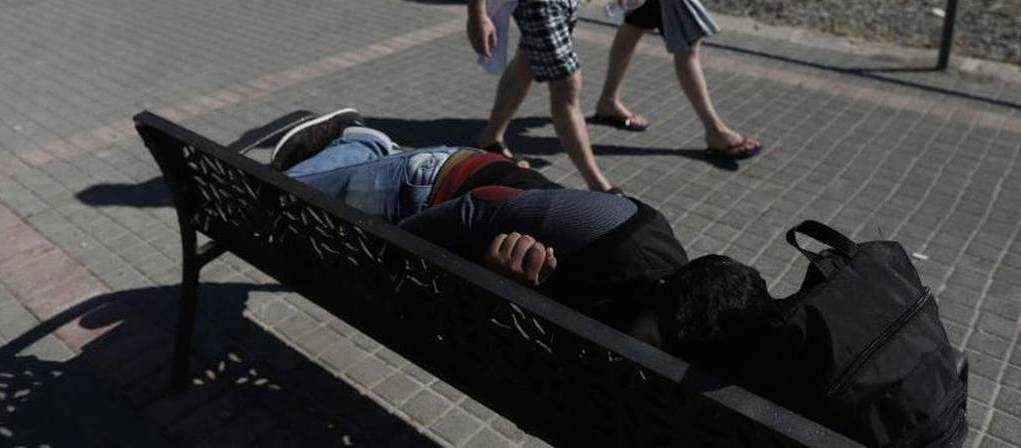‘We often pull up skulls and bones in our nets.’ (Lampedusa fisherman to BBC reporter, April, 2015)
Imogen Tyler, professor of Sociology at Lancaster, discusses her research on stigma and migration. In the context of the ongoing migrant crisis in Europe, Tyler warns against ‘the intensive proliferation of legal instruments to (re)distribute mobility along market lines’.
If you arrive at Europe’s borders today, the class of migrant you are sorted into matters. It matters because it determines your mobility, your ability to cross a border, the kind of risks you might have to take to do so, and your ability to stake a claim to remain in a particular place. It also matters because it shapes how you are perceived and treated by those you encounter on your journey. In short, how you are classified as you cross, or attempt to cross, a border determines your access to mobility. It determines how long the periods of waiting you might have to endure will be, and under what conditions you will have to wait. As we have seen in Europe this year, this process of classification, the practices and technologies through which people on the move are sorted, can have devastating consequences.
How you are classified as you cross, or attempt to cross, a border determines your access to mobility.
According to the UN High Commissioner for Refugees, 60 million people, that is ‘1 in every 122 humans is now either a refugee, internally displaced, or seeking asylum’ (UNHCR, June 2015). At least 500,000 people have made their way to Europe by perilous sea-crossings so far this year, an estimated 3,000 of these have drowned en route.
Many argue that during these times of ‘crisis’ we need urgently to redraw distinctions between types of people on the move, in order to determine how to better distribute access to mobility. Arguments centre on whether access to mobility should be determined and distributed on moral or economic grounds: should those fleeing war, for example, be given a higher priority to access mobility than those escaping unemployment or poverty? Or should mobility be distributed according to the economic imperatives and policy objectives of the receiving state?
Should those fleeing war be given a higher priority to access mobility than those escaping unemployment or poverty?
The later market-model of mobility is currently in ascendance in Europe. We can see this in government-approved shortage occupation lists, and in laws which determine, for example, that only migrants earning over a certain threshold will be able to enter or indeed remain in a particular place. From 2016, only migrant workers earning at least £35,000 will qualify for settlement in the UK.
We might understand this marketization of mobility as symptomatic of the ‘decisive break with the postwar consensus’ in Europe (Hall, 1998: 2).
For example, let us consider how the moral argument for the distribution of access to mobility has been eroded. The term ‘refugee’ has a specific international legal genealogy enshrined in the 1951 United Nations Convention Relating to the Status of Refugees. Yet there has been a fundamental attrition of both the legal status and popular meaning of the term ‘refugee’ in contemporary Europe. The legal status of ‘refugee’ has been radically weakened in part through the emergence of another category, the ‘asylum-seeker’, which began to gain political, legal and popular currency in Europe in the 1990s. By inscribing the category of asylum-seeker in law, through the enactment of punitive bureaucratic asylum laws and policies, European states have manoeuvred around their obligations as signatories to the 1951 convention. We can see circumvention of a moral and rights based understanding of human mobility in the proliferation of other classifications, such as ‘temporary leave to remain’. These allow those who manage to only time-limited leave to reside, with no right to settle and/or become citizens. Indeed, the small number of Syrian refugees which Britain has agreed to house will be granted ‘humanitarian protection status’ for five years, after which time they will either need to apply for to remain longer, leave or be forcibly deported. In other words, Britain is actually accepting no Syrian refugees at all, in the original legal sense of the term. The current ‘competitive downgrading of refugee protection standards’ across Europe marks a decisive break with the post-war consensus on refugee mobility, which sought to make sure that death-camps would never again be possible in Europe.
Britain is actually accepting no Syrian refugees at all, in the original legal sense of the term
“Refugee rights have also been systematically undermined by the proliferation of regional and transnational deterrence measures, such as the off-shoring of detention facilities and other nefarious arrangements with transit states, which ‘block safe and legal routes’ of travel in order to prevent people from arriving to make asylum-claims” (see Tyler and Loyd 2015). The Hungarian government, for example, ‘has invested more than 100 million euros on razor-wire fencing and border controls’ transforming itself into what Amnesty International describe as ‘a refugee protection free zone’. Camps are proliferating in Europe once again.
Immobilizing Practices
Jenna Loyd describes the multiple forms and practices of immobilisation now frequently endured by people on the move around the world as ‘Global Apartheid’. Importantly, Loyd links the domestic policing of citizen populations (through immobilizing practices, such as ‘stop and search’, increasing rates of imprisonment) to border control mechanisms that target non-citizens (such as dawn raids, immigration detention and deportations). As she writes:
Global apartheid is constituted most evidently through migration regulations and practices of border policing, militarization, and interdiction. Yet global apartheid is not solely about assertions of nation-state sovereignty internationally or at national boundaries. Not only does global apartheid rely on the fortification and policing of sovereign territory and on the delegation of this work regionally to third countries, but it also relies on domestic policing and crime policies and their infrastructure of detention facilities, jails, prisons, and the methods for moving people within this network or removing them through deportation (Loyd, 2015)
From a UK perspective, we can add to Loyd’s analysis the impact of Governmental policies of ‘permanent austerity’ on people’s differential access to mobility. In the aftermath of the North Atlantic Financial Crisis (2008), a politics of austerity has emerged across Europe, driven by global institutions such as the IMF in conjunction with state-governments. The British Coalition Government (2010-2015) and current Conservative Government have responded to this crisis by implementing ‘the deepest and most precipitate cuts ever made in social provision’ (Taylor-Goodby, 2013: viii). As Peter Taylor-Goodby details, the most severe cuts to state welfare have targeted the benefits and services of ‘those of working age, particularly affecting women and families, notably women, children and disabled [people]’ (2013: viii). At the time of writing it is evident that the current programme of cuts is deepening inequalities in multiple ways and impoverishing growing numbers of families and notably, children and disabled people.
In a period of stagnating wages, insecure work and zero-hours contracts, when welfare benefits have in real terms been diminishing, poverty amongst vulnerable groups, such as children and disabled people, have been rapidly increasing and are projected to continue to rise (see for example Xavier et. al. 2014), and there is a well-evidenced increase of dependence amongst low-income groups on foodbanks and other charitable services to secure basic needs (Dowler and Lambie-Mumford, 2015). The attrition of welfare, precarious employment and low wages have a negative impact on people’s access to everyday mobilities. Consider for example the massive cuts to disabled people’s ability to access social care, but also the forms of forced mobility which policies such as ‘bedroom tax’ and evictions from social housing (to make way for gentrification projects) are effecting. Moreover, the rate of forced evictions is accelerating:
County court bailiffs in England and Wales evicted more than 11,000 families in the first three months of 2015, an increase of 8% on the same period last year and 51% higher than five years ago. […] Nearly 42,000 families were evicted from rental accommodation in 2014, the highest number since records began in 2000 (The Guardian).
In short, what I am suggesting is that we can trace multiple ways in which the marketization of mobility, in which only the rich or those with other forms of capital at their disposable can move, or conversely resist forced movement, is reshaping social life in profound ways.
The ability to access mobility, the right to move and the right to resist being moved against your will, are intimately inter-twinned with your perceived ‘market value’. Perhaps this has always been the case, but certainly we are also witnessing an intensive proliferation of legal instruments to (re)distribute mobility along market lines. Saskia Sassen suggests that historically speaking, the contemporary period has seen a decisive shift from a phase of increasing social and economic inclusion’ to a period characterised by expulsion – a destructive force which cuts across conceptual boundaries’ (2015: 214-215). I am suggesting that we might think this shift through the lens of access to mobility. In short, the well-documented deepening of inequalities symptomatic of neoliberal forms of capital bears directly on human mobility of all kinds. It includes the ability to move across state borders, but also crucially, social mobility, your ability to access education, health, a decent place to live and secure employment. The systemic erosion of access to mobility has led to ‘the miseration and exclusion of growing numbers of people’ (Sassen, 2015: 10).
In this era of expulsion, when forced movements and immobilizing practices are growing exponentially, we might conclude that access to mobility is an index of the relative value of human lives.
References
- Elizabeth Dowler and Hannah Lambie-Mumford,. (2015) ‘How Can Households Eat in austerity? Challenges for Social Policy in the UK’, Social Policy and Society, 14, 3, 417-428
- Stuart Hall (1988) The Hard Road to Renewal: Thatcherism and the Crisis of the Left, (Verso).
- Holguer Xavier, Jara Tamayo and Chrysa Leventi (2014) A note on EU27 child poverty rates: research note prepared for Child Poverty Action Group
- Jenna Loyd (2105) ‘Carceral Citizenship in an Age of Global Apartheid’, Occasion. 8: 1-15
- Saskia Sassen (2015) Expulsions: Brutality and Complexity in the Global Economy, Harvard University Press
- Peter Taylor-Goodby (2013) The Double Crisis of the Welfare State and What We Can Do About It, Palgrave
- Imogen Tyler and Jenna Loyd (2015) ‘In a world of commonplace horrors, how do we talk about the refugee crisis?’ Open Democracy, 1st December
Imogen Tyler is undertaking a new project on stigma and inequality provisionally entitled ‘Rethinking the Sociology of Stigma‘. Her latest book is Revolting Subjects: Social Abjection and Resistance (Zed, 2013). She tweets: @DrImogenTyler
Main photo: Refugees of Kos; skibbereeneagle.ie.




